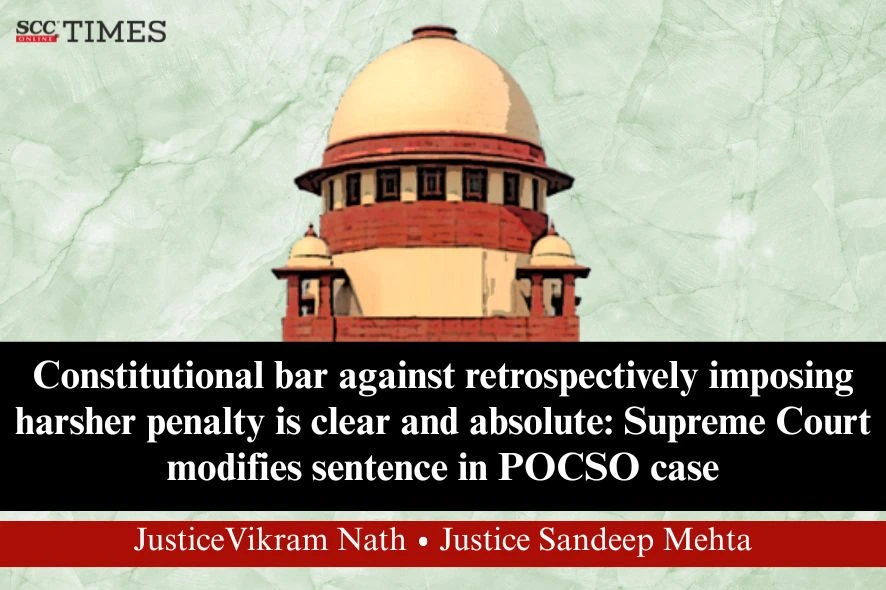Supreme Court: In an appeal challenging the judgment dated 5-9-2023, whereby the appellant’s challenge to his conviction under Section 376-AB of Penal Code 1860 (‘IPC’) and Section 6 of Protection of Children from Sexual Offences Act, 2012 (‘POCSO Act’) was dismissed, the Division Bench of Vikram Nath* and Sandeep Mehta, JJ., stated that the constitutional bar against retrospective imposition of a harsher penalty under Article 20(1) of Constitution was clear and absolute. The Court stated that the sentence of “imprisonment for life, meaning remainder of natural life”, as per the amended provision under Protection of Children from Sexual Offences (Amendment) Act, 2019, did not exist in the statutory framework on the date of the incident.
Accordingly, the Court upheld the appellant’s conviction under Section 6 of the POCSO Act, and modified the sentence to rigorous imprisonment for life, as understood under the unamended statute, and set aside the sentence of imprisonment for the remainder of the natural life.
Background
On 26-6-2019, the prosecutrix’s father lodged a FIR stating that on 20-5-2019, he, his wife, and mother went to attend a marriage ceremony in the village, leaving their two children at home. The 5 years old prosecutrix, was playing outside the house. Later, when his wife was unable to locate their daughter, she went to the appellant’s house and questioned him about her whereabouts. However, upon being confronted, the appellant fled.
The FIR was registered against the appellant alleging that he had lured the prosecutrix to his house and committed rape upon her. The Trial Court framed charges against the appellant under Section 376-AB of IPC and Section 6 of POCSO Act. Accordingly, he was convicted and sentenced under Section 6 of POCSO Act to life imprisonment for the remainder of his natural life, along with a fine. Chhattisgarh High Court, in the impugned judgment, affirmed the conviction and sentence.
Thus, aggrieved by the said conviction and sentence, the present appeal was filed.
Analysis, Law, and Decision
The Court found no merit in the challenge to conviction and confined its notice to the question of sentencing. However, the Court found merit in the appellant’s submission that since the offence was committed on 20-5-2019, the amended provision of Section 6 of the Protection of Children from Sexual Offences (Amendment) Act, 2019 (‘2019 Amendment Act’), which came into force on 16-8-2019, could not have been applied to his case.
The Court stated that the constitutional bar against retrospective imposition of a harsher penalty under Article 20(1) of Constitution was clear and absolute. The Trial Court, in applying the enhanced sentence introduced by the 2019 Amendment Act to Section 6, had effectively subjected the appellant to a punishment greater than that which was permissible under the law in force at the time of commission of the offence which was clearly violative of the bar contained in Article 20(1) of the Constitution.
The Court stated that the sentence of “imprisonment for life, meaning remainder of natural life”, as per the amended provision, did not exist in the statutory framework on 20-5-2019, the date of the incident. Under the unamended Section 6 of POCSO Act, the maximum punishment permissible was life imprisonment in its conventional sense and not imprisonment till the remainder of natural life.
Accordingly, the Court upheld the appellant’s conviction under Section 6 of the POCSO Act. Further, the Court modified the sentence to rigorous imprisonment for life, as understood under the unamended statute, and set aside the sentence of imprisonment for the remainder of the natural life. However, the fine of Rs. 10,000 was maintained.
[Satauram Mandavi v. State of Chhattisgarh, 2025 SCC OnLine SC 1516, decided on 25-7-2025]
*Judgment authored by- Justice Vikram Nath
Advocates who appeared in this case:
For the Appellant: Shalu Sharma, AOR.
For the Respondents: Atul Jha, A.A.G.; Abhishek Pandey Standing Counsel, Adv.; Prashant Kumar Umrao, AOR.





